November 21, 2025 | 08:19 GMT +7
November 21, 2025 | 08:19 GMT +7
Hotline: 0913.378.918
November 21, 2025 | 08:19 GMT +7
Hotline: 0913.378.918
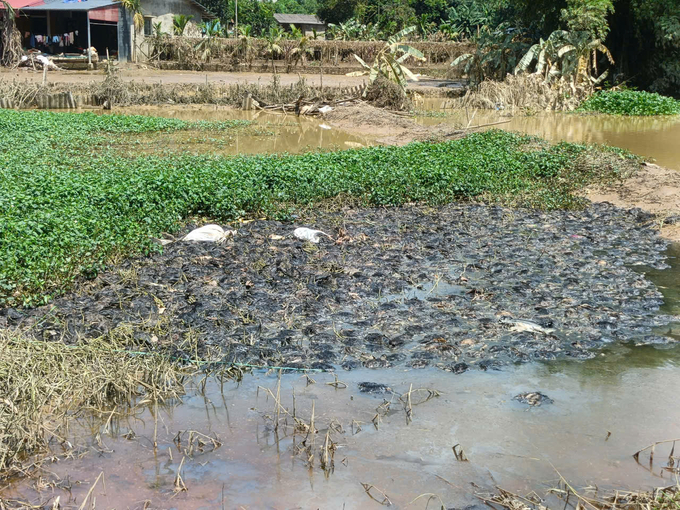
After the flood, many livestock farmers were left empty-handed and in debt. Photo: Thanh Tien.
The unfinished house was flooded and still full of mud. Nguyen Truong Xuan (Minh Thanh village, Tuy Loc commune, Yen Bai city) looked dazed. He had not yet recovered from the recent terrible flood. Xuan's wife, Nguyen Thi Ninh, carried a small basin of water to clean the chicken feeders that had just been pulled out of the mud. “I lost everything! Now all that's left is the empty cages,” Xuan said with tears in his eyes.
The 500m2 empty chicken coop had just been raked and washed by the couple to reduce environmental pollution. Right outside, dead chickens were scattered everywhere, full of maggots. In the pond, hundreds of dead chickens were floating, forming rafts. It was a horrifying scene.
5,000 chickens at Xuan's farm died due to flooding. Video: Thanh Tien.
Xuan's chicken farm only raises the black-bone, black-meat H'Mong chickens. They have been raised for 3 months now and will be sold in about a month. With a contract price of VND 86,000/kg, the family expects to earn nearly VND 800 million. After the flood, all that remains are the dead chickens and a debt of nearly VND 600 million.
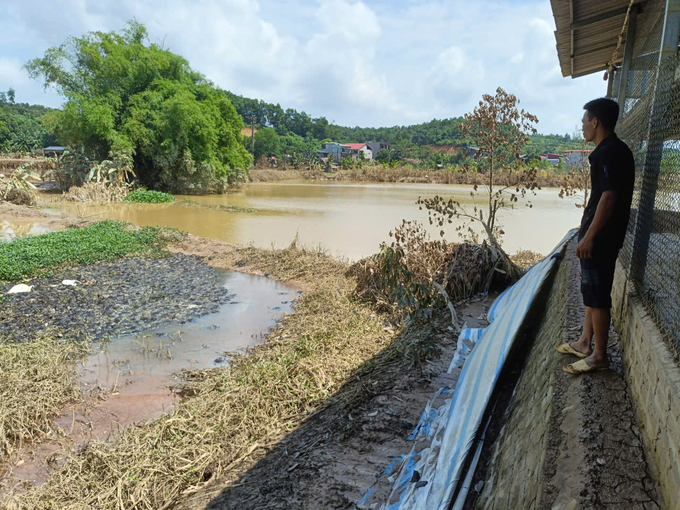
Dead chickens and a pile of debt are all that Xuan has left after the storm. Photo: Thanh Tien.
Over 1 km from Xuan's family's chicken farm is another scene of devastation at the pig farm of Hoa Binh Minh Company in Tuy Loc commune, Yen Bai city. Flooded trucks lying at the farm gate, electric poles, and fallen trees show the brutality of the recent flood.
The farm with 10 rows of barns, 16 workers, and 5,000 pigs is now a quiet ruin. Nearly 50 surviving pigs were sold for only VND 55 million. More than 4,800 pigs were swept away by the raging flood, hundreds of them died scattered across the fields. The estimated damage is nearly VND 40 billion.
Devastating sight of a 5,000-pig farm after the flood. Video: Thanh Tien.
Devastating sight of a 5,000-pig farm after the flood. Video: Thanh Tien.
The company is now focusing on repairing and cleaning the livestock areas, cleaning up the less damaged areas first, and repairing the areas that need machinery later. “The entire herd of pigs has been wiped out. We just hope that the authorities will have support policies so that the business can recover,” said Pham Thi Phuong Vinh, Director of Livestock, Hoa Binh Minh Company.
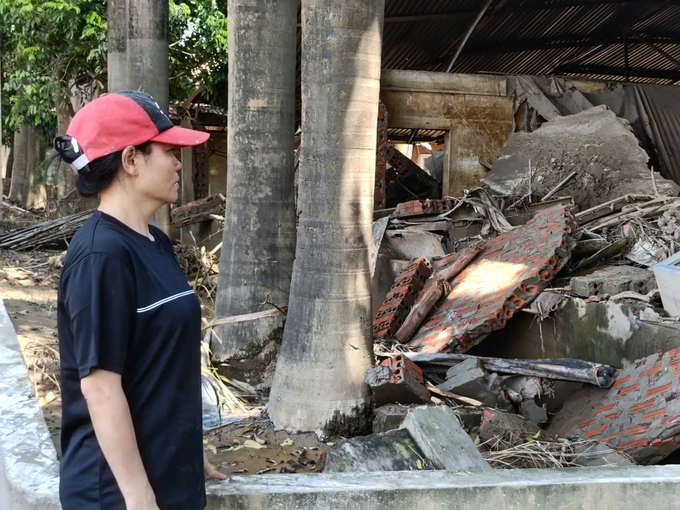
Vinh was heartbroken while looking at the ruined farm. Photo: Thanh Tien.
Data from the Department of Animal Husbandry and Veterinary Medicine of Yen Bai province shows that Typhoon No. 3 caused the province's livestock industry to lose more than 7,000 cattle and nearly 350,000 poultry of all kinds.
According to Dam Duy Duc, Head of Yen Bai Sub-Department of Livestock Production and Animal Health, in order to restore livestock production after Typhoon No. 3, the Sub-Department issued Official Dispatch No. 218 on September 13 on proactively preventing epidemics, restoring and protecting livestock after floods.
The unit coordinated with localities to establish delegations to communes, wards and towns. The objective was to urge and guide the implementation of disease prevention and environmental treatment after floods. Livestock farmers received instructions on measures to ensure the safety of their livestock. The Sub-Department is also aiming to develop plans to support in terms of breeding stock, chemicals to treat the environment, discard dead animals, and supplement medicines and vaccines to prevent diseases.
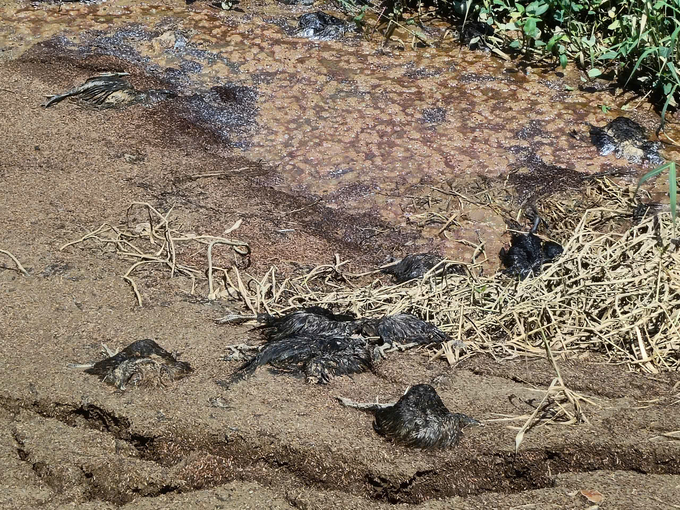
Environmental treatment is of utmost importance before restocking. Photo: Thanh Tien.
In preparation for herd restoration and production recovery, the Sub-Department recommends that livestock farmers choose breeds with clear origins from reputable suppliers, quarantine certified and fully vaccinated according to regulations. Farmers should not restock when environmental and disease safety are not guaranteed.
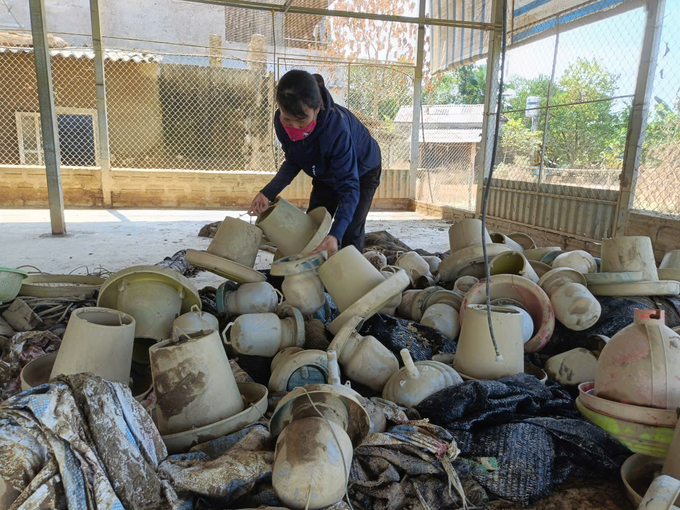
There should be specific policies to support livestock farmers affected by floods. Photo: Thanh Tien.
On September 19, a working group from the Department of Livestock Production inspected the actual damage caused by Typhoon No. 3, gave out directives and prevented livestock diseases in Yen Bai province. During the working trip, the group visited Tuy Loc commune, Yen Bai city and a number of farms to specifically assess the damage to farms and livestock households.
Based on the collected information and recommendations from farm owners and livestock households in the province, the working group will provide advice on implementing mechanisms and policies to support livestock farmers affected by storms and floods in accordance with the actual conditions at the grassroots level.
Translated by Samuel Pham

(VAN) Amid vast floodwaters, the spirit of sharing and helping others shown by many people in Gia Lai reached tens of thousands of residents stranded by raging floods.

(VAN) Climate change is set to emerge as a key focus of collaboration within the framework of the Comprehensive Strategic Partnership between Viet Nam and New Zealand.

(VAN) Future veterinarians will be the ones directly deciding how antibiotics are prescribed, administered, guided and managed across thousands of farms nationwide.

(VAN) Argentine Ambassador Marcos Antonio Bednarski says Viet Nam is playing an increasingly influential role in Argentina’s economic and technical engagement in Southeast Asia, as Buenos Aires is seeking long-term partners.

(VAN) Prime Minister requested local authorities to use all available measures to reach residential areas that are deeply flooded, cut off, isolated, or affected by landslides.

(VAN) To confront historic flood surge on Ba and Kon rivers, the Prime Minister requested local authorities to mobilize all available forces, evacuate residents, and ensure reservoirs and dams safety.

(VAN) The United Kingdom (UK) has offered to assist Vietnam in accessing significant financial resources to drive agricultural innovation while simultaneously expanding the market for forest-based carbon credits.